I love being trans, die mad about it. I'm Link, a 22 year old Spanish trans man (he/him only). I'm also pansexual. I'm anti-truscum/anti-transmed, antifa, and what the kids call a tucute. If you're gonna misgender, say slurs and suicide bait people, unfollow me. (Replies to my posts are disabled just because this is a side blog)
Don't wanna be here? Send us removal request.
Photo
Besides what terflies said, it is literally a lie to say that GP “could’ve lost her job”. Misdiagnosing someone is not reason enough to be fired, specially if the patient was lying about their symptoms. There is just no real reason a person in this situation would be fired.
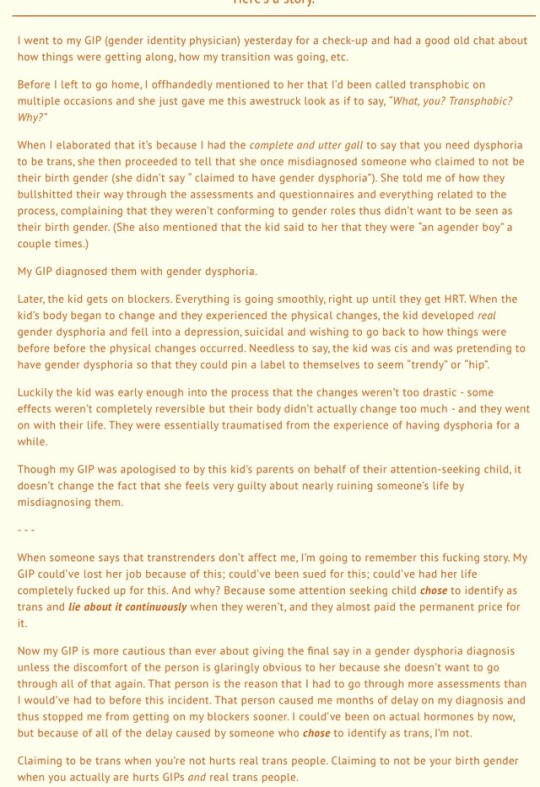
I would reblog the original, but I couldn’t find it. This kind of shit needs to be fucking everywhere for those tucutes to see.
2K notes
·
View notes
Photo

fucking hell
#not only is this disgusting and vile but it's just so pathetic#'being mildly inconvinience by a twitter ban is basically the same as literally dying a painful death'#imagine being this homophobic ugh
204 notes
·
View notes
Text
Ok Incongruence: Not congruent [Congruent: If one thing is congruent with another thing, they are similar or fit together well (source)] Dysphoria: a state of feeling very unhappy, uneasy, or dissatisfied (source)
In what world is [not similar or not fiting together well] lumped with [a state of unhappiness, unease, or dissatisfaction]? How or why would they be lumped together when incongruence doesn’t imply anything medically wrong or bad whereas dysphoria is by definition negative?
It makes no sense to say that incongruence (something not matching) is a type of distress (which means unhappiness or worry). Something not matching is not in itself distressing.
So anyways, you don’t need dysphoria to be trans, incongruence and dysphoria are different things, and dysphoria isn’t just discomfort.
When transmeds say “incongruence is just minor dysphoria” it makes me want to fucking punch something, because ya wanna know something? The phrase “minor dysphoria” is an oxymoron. Dysphoria is, by definition, significant and debilitating distress. Dysphoria is a disorder/mental illness. For something to be a disorder/mental illness, it has to be debilitating in one way or another. There is no such thing as “minor dysphoria.” You can have fluctuating/occasional dysphoria, but if it’s not extreme distress then it ain’t dysphoria. It’s incongruence.
As someone with multiple types of dysphoria, not just gender dysphoria, the idea that dysphoria can be “just discomfort” is insulting at best and downright harmful at worst.
Stop making light of my mental illness and get your head out of your ass, scum.
471 notes
·
View notes
Text
It was called gender dysphoria specifically so that it was clear that it implied distress, but apparently it still went over some people’s head.
So anyways, you don’t need dysphoria to be trans, incongruence and dysphoria are different things, and dysphoria isn’t just discomfort.
When transmeds say “incongruence is just minor dysphoria” it makes me want to fucking punch something, because ya wanna know something? The phrase “minor dysphoria” is an oxymoron. Dysphoria is, by definition, significant and debilitating distress. Dysphoria is a disorder/mental illness. For something to be a disorder/mental illness, it has to be debilitating in one way or another. There is no such thing as “minor dysphoria.” You can have fluctuating/occasional dysphoria, but if it’s not extreme distress then it ain’t dysphoria. It’s incongruence.
As someone with multiple types of dysphoria, not just gender dysphoria, the idea that dysphoria can be “just discomfort” is insulting at best and downright harmful at worst.
Stop making light of my mental illness and get your head out of your ass, scum.
471 notes
·
View notes
Text
It’s mostly truscum who say dysphoria is a disconnect. “tucutes” say you don’t need dysphoria to be trans because the medical definition of dysphoria says a significant distress is needed, and you don’t need to be distressed to be trans.
You need dysphoria to be trans
And to be clear, dysphoria is a disconnect from your birth gender (the tucute definition) OR you are uncomfortable with you assigned gender at birth (transmed / truscum definition)
And some people have one or the other, and some people have both
45 notes
·
View notes
Text
gender dysphoria is NOT “wanting to be a different gender than the one you were born as” ??
Gender dysphoria is a medical diagnosis that has specific diagnostic criteria, which includes gender incongruence (your gender identity not matching your assigned gender) and medically significant distress.
the usual website I use for meme formats isnt working properly so i had to use my phone's editing software
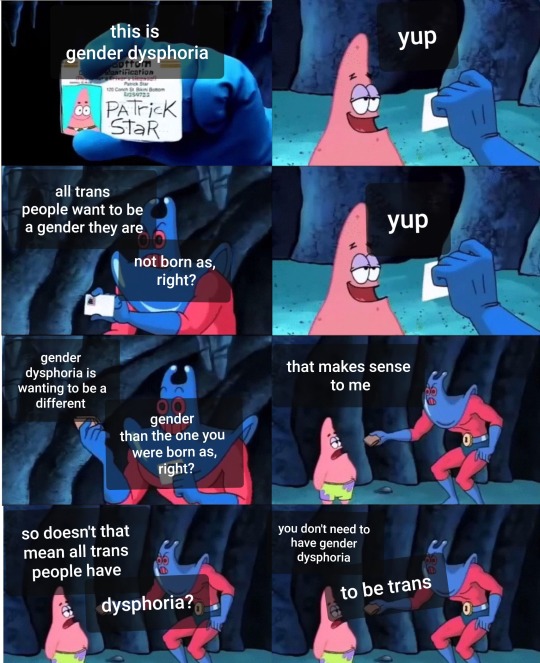
19 notes
·
View notes
Photo

hehe..... the weed number........
17 notes
·
View notes
Text
Truscum/transmed: I follow Science and Facts.
Also truscum/transmed: I was born with dysphoria.
19 notes
·
View notes
Text
Cringe culture is cancelled and I love every teenage tucute with dyed hair and very specific identity terms
136 notes
·
View notes
Text
shoutout to dysphoric trans people that still get called trenders for other reasons
shoutout to nondysphoric trans people that get called trenders for reasons other than the lack of dysphoria
shoutout to dysphoric trans people that get told their dysphoria "isn't real" & that they're actually nondysphoric & are therefore a trender
you're still trans no matter what other people think of you, & if you have dysphoria then it is real no matter what random people online say
198 notes
·
View notes
Photo
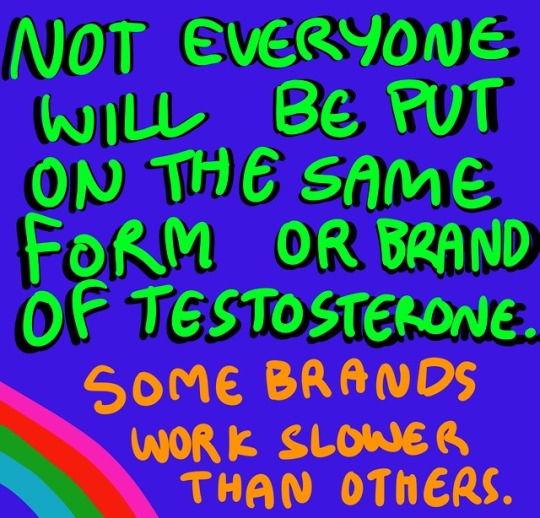
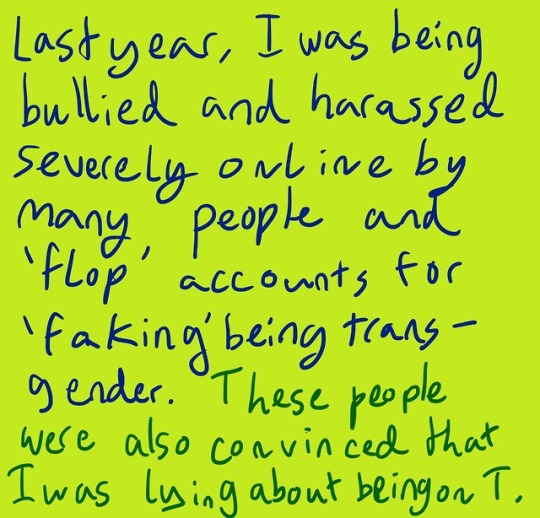
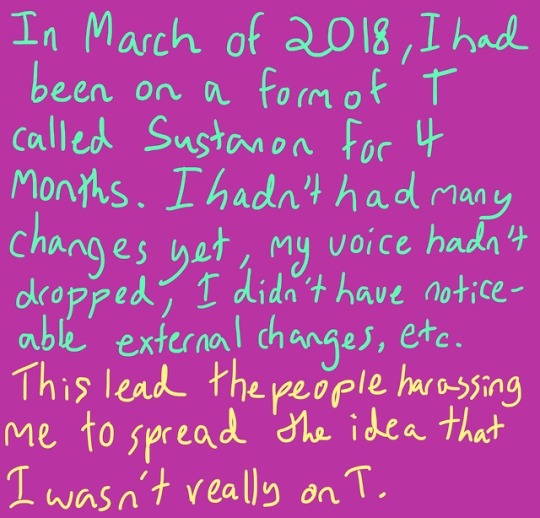

I didnt know something so simple and obvious as ‘not every country operates like yours’ had to be explained to Muricans™ but i guess it does! This is also a warning to people who might get put on a less potent form of T like Sustanon or Reandron. Things might not go the way you expect, personally it was hell to wait years for T and to then have to wait nearly a year after i went on T for my voice to drop. I wish more people talked about this so I could have been more emotionally prepared.
Basically, stop assuming you know literally anything about someone else’s transition, and prepare yourself for your transition to not go how you expect it to.
576 notes
·
View notes
Text
He/Him - Butch Lesbians
I’m here to tell you that, as a trans man, he/him lesbians aren’t hurting me, or anyone else.
It’s not our obligation to tell people what pronouns they can use. If a lesbian wants to use he pronouns for any reason, then let him. If a butch lesbian wants to take T get surgery, then let them.
To many trans male truscum are concerned about how they would look in the eyes of transphobes, rather than trying to define themselves, and paying less attention to what transphobes think of them. There is a major difference between butch lesbians/he-him lesbians, and trans men. One group are women/female-aligned/lesbians, and the other are just..men!
If a transphobe/lesbophobe can’t see the difference, that’s. their. problem. Not any lesbian’s problem.
Also, as a man, I shouldn’t really be dictating what a lesbian should use as pronouns. Neither should I be telling pre-T/transitioning lesbians that they can’t get treatment that trans men usually get. It’s sick, and makes me a misogynist and lesbophobe if I do that. And that goes for you male truscum.
TLDR; let lesbians use what pronouns they want, and they can transition and take T if they please. It’s not up for trans men (especially truscum) to decide.
3K notes
·
View notes
Text
Understanding that gender incongruence is not a disorder of any kind does not equal believing that “being trans is a choice”. The “evidence” provided by those review articles are not sufficient in concluding that “trans is a neurological disorder”. Those articles often cited by trumeds and news media outlets contain data that even the researchers behind them don’t know what it truly means.
I mean this when I say it: the articles that I have taken time to read, provided by transmeds (not all of the 65 source-dumped articles on one post), have not concluded that gender incongruence is a neurological disorder. Even the ones from PubMed.
There was even an NCBI article discussing the issues with categorizing gender incongruence, also including a section of a hypothetical categorization of GI as a “neurological disorder or medical condition”. The article, overall, made it clear that demarcating GI to a single category will make things confusing and will not really solve these problems.
As I write this post, I’m looking for the article. I’ll try to find it soon.
Not believing in transmedicalist ideology does not mean that one deems being trans as a “choice”. That is fallacious and has no basis.
51 notes
·
View notes
Text
FAQ
(last updated June 27, 2019)
Q: What is dysphoria?
A: Dysphoria is a diagnostic term meaning “profound distress or discomfort.” It is a common symptom of many psychiatric disorders. It’s been used this way for over a century (example 1, example 2, example 3). “Gender dysphoria” refers to dysphoria that occurs as a result of incongruence between a person’s assigned sex and gender identity. To meet the diagnostic criteria for the psychiatric disorder “Gender Dysphoria” the DSM-V specifically states that the incongruence must cause “significant distress or problems functioning.” Sex/gender incongruence that doesn’t cause this distress or dysfunction is NOT considered disordered.
Q: I was told that the APA defined dysphoria as “conflict between a person’s physical or assigned gender and the gender with which he/she/they identify.”
A: This particular line is a quote from a page on the APA website that was meant to briefly summarize the diagnostic criteria for Gender Dysphoria. It is not the full diagnostic criteria, which is described further down the page. Along with the checklist of traits, the diagnostic criteria for both children and adults include “distress or inpairment functioning” as specific necessary condition: “In adolescents and adults gender dysphoria diagnosis involves a difference between one’s experienced/expressed gender and assigned gender, and significant distress or problems functioning […] In children, gender dysphoria diagnosis involves at least six of the following and an associated significant distress or impairment in function, lasting at least six months.” Again: that “distress or problems functioning” criteria is mandatory; this is why the line meant to summarize gender dysphoria uses the word “conflict” instead of a more neutral term like “incongruence” or even “difference.” The APA’s endorsed expert opinion on the subject states more explicitly that “not all transgender people suffer from gender dysphoria.” According to members of the APA workgroup responsible for writing the Gender Dysphoria diagnostic criteria, the term “dysphoria” was chosen based on the logic that “if the new diagnosis would focus more on the dysphoria aspect (e.g., in the name) than does the current one, no separate distress criterion would be necessary, because the distress would be defined as inherent to the diagnosis” (sci-hub pdf). Note that they ended up keeping the distress criterion in the diagnosis despite the redundancy, presumably because they were afraid that it might not be clear enough that they were referring to distress while using a medical term that literally means “significant distress.”
Q: Why does it matter how we define dysphoria?
A: It’s a matter of relevance. When discussing gender dysphoria in the context of the medical model, the relevant definition is the one that gets used within the medical system.
Q: But what if we worked to change the medical definition of gender dysphoria?
A: I’ve see this idea brought up in my notes a few times, and it’s honestly just a terrible idea. The overpathologization of distress responses is a huge concern within psychology, and it’s one of the reasons the medical definition of gender dysphoria is so limited. Extending that definition to include things like “feeling bad when you’re mistreated” is, at best, a step backward.
Q: What makes a person transgender, if not dysphoria?
A: An incongruence (mismatch) between their gender identity and their assigned sex category.
Q: How can someone know they’re trans without dysphoria?
A: Many non-dysphoric trans people cite “gender euphoria” as their main clue. Others simply describe feeling a strong desire to be a certain gender that differed from their assigned gender.
Q: Isn’t that just dysphoria?
A: No. As I’ve already pointed out, dysphoria is a diagnostic term referring specifically to profound distress. While it’s certainly common for these other signs of gender incongruence to be accompanied by distress or discomfort, these are not themselves always inherently distressing experiences. The very epicurian idea that gender euphoria is simply a result of gender dysphoria is a false dichotomy based on a zero-sum understanding of pain and pleasure.
Q: Does this mean being transgender is a choice for non-dysphoric trans people?
A: No. While all of us, dysphoric or otherwise, have a choice in what labels we use & which identities we claim, the process through which gender identity is formed is incredibly complex and not incredibly well understood. Non-dysphoric trans people may have less incentive to come out or transition than those of us who do experience dysphoria, but this isn’t the same thing as choosing to have a transgender identity.
Q: Why would someone who’s 100% comfortable with their body transition?
A: First off, most people aren’t 100% comfortable with their bodies, and there’s a wide range of experiences that exist between” complete and total comfort” and “significant distress.” Non-dysphoric trans people seek out medical transition for various reasons, including legal barriers to social transition (eg medical requirements to update ID), feelings of euphoria associated with specific traits, or simply a desire to present in a way that is more congruent with their identities.
Q: What sources say that you don’t need dysphoria to be transgender?
A: The American Psychiatric Association explicitly says that dysphoria is not necessary “ Not all transgender people suffer from gender dysphoria and that distinction is important to keep in mind. Gender dysphoria and/or coming out as transgender can occur at any age.” The World Health Organization’s ICD-10 acknowledges the existence of non-dysphoric trans people with its description of “transsexualism” as “usually accompanied by a sense of discomfort… or inappropriateness.” The American Psychological Association: “A psychological state is considered a mental disorder only if it causes significant distress or disability. Many transgender people do not experience their gender as distressing or disabling, which implies that identifying as transgender does not constitute a mental disorder.” The American Academy of Pediatrics describes gender dysphoria as a potential consequence of being trans: “ Some youths experience gender dysphoria when the incongruence between assigned sex at birth and asserted gender identity becomes so distressing that it impairs the youth in school, relationships and overall functioning… However, there is no evidence that risk for mental illness is inherently due to a gender-diverse identity.” The Canadian Paediatric Society provides this definition of Gender Dysphoria: “Describes the level of discomfort or suffering associated with the conflict that can exist between a person’s assigned sex at birth and their true gender. Some transgender children experience no distress about their bodies, but others may be very uncomfortable with their assigned sex, especially at the start of puberty when their body starts to change.” The World Medical Association cites the APA definition of dysphoria: “The WMA asserts that gender incongruence is not in itself a mental disorder; however it can lead to discomfort or distress, which is referred to as gender dysphoria (DSM-5).” WPATH states that “the criteria currently listed for [Gender Dysphoria] are descriptive of many people who experience dissonance between their sex as assigned at birth and their gender identity… The DSM-5 descriptive criteria for gender dysphoria were developed to aid in diagnosis and treatment to alleviate the clinically significant distress and impairment that is frequently, though not universally, associated with transsexual and transgender conditions” (emphasis added). (Note: this list is not intended to be exhaustive)
Q: I was told the American Psychiatric Association isn’t trustworthy, so why do you use it as a source?
A: I’ve written a big post here analyzing criticism of the APA (and particularly, their handling of trans identities); the short version is that the APA has been very heavily criticised in the past for supporting many of the same positions truscum advocate in favour of today. While the APA & DSM aren’t perfect, they aren’t exactly the mess truscum claim they are either.
Q: What about brain scan research? Doesn’t that prove dysphoria is required?
A: No. Brain sex research in interesting, but the results are nowhere near as clear-cut as many people believe. Yes, there’s been studies that have observed similarities between the brains of dysphoric binary trans people and cisgender people who share their identities. This is correlational research that can’t be used to infer causation without further evidence, and researchers still aren’t sure what exactly it means. There’s also the problem of attempting to apply a body of research to non-dysphoric trans people that includes few, if any, results from non-dysphoric trans participants.
Q: How can someone transition without a dysphoria diagnosis?
A: Depending on where you are, there may be clinics in your area that operate on an informed consent model of transition. Unlike the traditional gatekeeper model of transition, informed consent models allow anyone who is competent to make their own medical decisions to receive transition care.
Q: What about John Money/David Reimer? Is this evidence that gender is not actually a construct?
A: John Money was a conversion therapy advocate who believed that he could force a child to identify with the gender of his choosing, and that there was no point in someone identifying as male without a functioning penis. Nothing about this disproves the idea that our genders are constructed, though it does demonstrate that the process of gender construction is beyond human control, at least on an individual level. Some of the terms Money coined may still be in use, but his claims about being able to force children to identify as a specific gender are pretty thoroughly rejected outside of the conversion therapy crowd. Additionally, bringing up the fact that certain terms were coined by Money without recognizing that those terms are currently used in a context that otherwise rejects his views is often used as an attempt to poison the well.
Q: What does “radscum” mean?
A: it’s an old term for the category of rad/fem than includes what we now call “TE/RFs” and “SW/ERFs.” It was still commonly used when the term “truscum” was coined to refer to post-HBS transmedicalism. In the communities I was active in, the term “truscum” caught on specifically because of how it reflected the relationship between the two groups (transmeds and radscum have a long history of co-operation, regardless of how any individual truscum today feels about that).
Q: Is it true that the person who coined the word “tucute” was a cis woman pretending to be trans?
A: No, it’s not.
Q: Why did you remove my response with sources from the replies of your post?
A: I didn’t.
About the mod:
Q: what are your pronouns?
A: Ey/em (like “they” without the “th-”)
Q: Why do you call yourself “transsexual”?
A: I’ve been using the term transsexual for myself for roughly a decade, and I refuse to give it up because some kids decided they own that word now.
Q: Do you ID as queer?
A: That’s one of the labels I use, yes.
Q: What other identity labels do you use?
A: I’m being intentionally vague about certain aspects of my ID on this blog because it’s interesting to watch what assumptions truscum make, but in general I’m neither straight nor cis & I use a variety of labels depending on the context I’m speaking in and the information I’m trying to communicate to my audience.
Q: How old are you?
A: Over 30 (which is part of the reason why I stick to responding to people who interact with me first instead of seeking out bad posts to argue against)
Q: Will you promo my discourse blog?
A: Sorry, no.
Q: Will you promo my fundraiser?
A: Please add a link to this post as a reblog or comment instead of messaging me.
768 notes
·
View notes
Text
the fact that this whole “if you transition without dysphoria will make you dysphoric” shit has only come up VERY recently, like in the past couple months, and I have YET to see a SINGLE source on that aside from linking another tumblr blog where someone just says the same thing is
wild
418 notes
·
View notes
